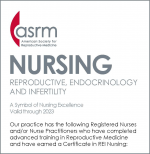Yes, it is recommended by ACOG (American College of Obstetrics and Gynecology) and ASRM (American Society for Reproductive Medicine) that all patients seeking to become pregnant, or are pregnant, receive the COVID 19 vaccine. The second dose of the vaccine (if you are receiving Pfizer or Moderna) can cause a fever in some people. Please plan your transfer one week before or one week after you receive your second dose.
Yes, you can receive the attenuated (dead) flu vaccine via intramuscular injection. Please do not receive the live nasal spray. The attenuated vaccine will not cause any harm to you or your fetus if pregnant.
Spotting after stopping birth control pills is normal. This happens because of the drop in estrogen level in your blood. Once you start the fertility injections the spotting will resolve and you will start to build a new lining for the embryo transfer.
Sometimes spotting can happen while you are actually taking the birth control pill, especially with the low dose pills that are used for fertility treatment. This is normal and you should continue with the active pills every evening until we tell you to stop the pills and start stimulation medication.
It is recommended that you go home and relax after transfer, you do not have to stay “in bed” for 24 hours. You can walk around the house and sit at the table for meals. We recommend all non-strenuous activities for 24 hours. This is a good time to order a pizza and watch a video
We do recommend avoiding caffeine, but moderate consumption (less than 200mg/day) does not appear to significantly affect miscarriage rates or contribute to low birth weight infants. One 8 ounce cup of coffee is 137mg of caffeine, one 12 ounce soda is 37mg of caffeine, and one 8 ounce of tea is 48mg of caffeine
You can get many health benefits from mild to moderate exercise. Regular exercise is better than sporadic exercise. If you have not exercised on a regular basis, start slowly and increase your activity level gradually.
If you do exercise regularly, modify your workout according to your symptoms and stop when you feel fatigued. You should avoid jerky movements and activities that require jumping, jarring motions and rapid changes in direction. You should avoid any activities such as abdominal crunches or jogging during treatment, walking at a slow pace is acceptable.
Although fairly limited, most research indicates the chemicals found in both semi-permanent and permanent dyes are not highly toxic and are safe to use during pregnancy. In addition, only small amounts of hair dye may be absorbed by the skin, leaving little that would be able to reach the fetus. If this concerns you please inform your Hair Dresser that you are pregnant and discuss product usage.
Discuss your medication of choice with your physician and pharmacist. It is recommended that only pregnancy category Class B (ask your pharmacist about your medication choice) medications should be used during pregnancy. If you are suffering from the common cold than increase fluid intake, take Tylenol only for aches and pains and get plenty of rest.
For IUI (intrauterine insemination) intercourse is recommended to continue after the IUI itself. If you are an IVF patient that is pregnant, it is advised that you avoid intercourse until your ultrasound appointment with your doctor. That will occur at around 6-8 weeks of pregnancy. The exact dates of your ultrasound will be discussed with you by your nurse.
Moderate alcohol intake during the stimulation phase of treatment is acceptable. This equates to one 8 oz. glass of wine or beer occasionally. Once an embryo transfer or IUI has taken place NO ALCOHOL should be consumed.
Some of the medications prescribed for a frozen embryo transfer or other treatment cycles like Donor-cycles are ordered for Brand only medications. The reason that our physicians prefer brand is due to past experience with some generic medications. They have found that in the past when some medications were ordered in the generic form, patients experienced mid-cycle bleeding and poor endometrial linings. They prefer to keep you on a medication that they are sure works well rather than chance having a decreased outcome from using a generic form. Your nurse will inform you which medications we prefer in brand and when generic is acceptable.
Most physicians will tell you that traveling in the first trimester is perfectly safe. Please remember if you are flying to walk around the cabin of the aircraft as much as possible and keep yourself well hydrated. This is to avoid any stagnation of blood and the resulting formation of blood clots that can occur with decreased activity and dehydration. The same is true for traveling by car. If you are driving, make frequent stops and keep well hydrated during the trip. Restrictions on traveling will occur in the third trimester.
Over the counter and prescription medicines may cross the placenta and enter the baby’s bloodstream. In some cases, these medicines can cause birth defects, dependency or other problems in the baby. Alternatively, some of these medications are perfectly safe in pregnancy so, it is important to share all medicines you are taking with your doctor so that alternative medications can be discussed and other treatment options explored if needed. Please DO NOT use any HERBAL supplements during your treatment cycle.
PGS/D (preimplantation genetic screening or diagnosis) usually takes 10-12 days from the time your biopsy arrives, for a result to come in from Natera. After we receive those results your chart, and the results from Natera, go to your doctor for review. The doctors will call you with the results however this can add an additional 2-4 days on to the waiting period. Please be assured we will call you back as soon as we can to discuss results and to make a plan for future frozen or fresh cycles.
No, you do not have to remove any nail polish. We have machines that will monitor your oxygen levels whether you have polish on or not.
This test is completed approximately 14 days after egg retrieval.
We will bring you for additional blood tests as directed by your doctor to make sure that the hormone HCG is rising appropriately. When you are 6-7 weeks pregnant we will do an ultrasound to make sure the pregnancy is in the uterus. Once a fetal heartbeat is documented, we will refer you to your OB for continuing care.
Some brown spotting after an IVF cycle is normal. If this is persistent or progressing to red blood please contact the office for evaluation.
If you are not pregnant you will speak with your physician and discuss what actions to take in the future.
Taking biotin supplements in high doses has the potential to interfere with hormone analyzers and result in incorrect lab test results. Biotin, otherwise known as vitamin B7, is a vitamin naturally present in some foods and available as a dietary supplement. Biotin is also commonly present in multivitamins, including many brands of prenatal vitamins. Current adequate intake recommendations for biotin for adult females are felt to be about 30 micrograms daily. Most general multivitamins, as well as those prenatal vitamins that include biotin, often contain 30 micrograms to several hundred micrograms daily. However, dietary supplements marketed for “hair, skin, and nail growth” can often contain very high amounts of biotin (2500-10,000 micrograms or 2.5-10 mg). These types of “megadoses” have been found to interfere with hormone lab test results from certain hormone analyzers, including the equipment used at the Center for Reproductive Medicine to monitor fertility treatments and early pregnancy. In fact, the Food and Drug Administration (FDA) issued a safety communication in 2017 regarding the potential for biotin lab test interference after a number of adverse events occurred resulting in a variety of misdiagnoses occurring in patients who were having certain lab tests while taking very high doses of biotin.
We recommend that patients consider discontinuing high dose biotin supplements for “hair, skin, and nail growth” while undergoing treatment at the Center for Reproductive Medicine. On the other hand, the amount of biotin contained in most general multivitamins and prenatal vitamins does not pose a problem. As some patients may not feel that it is important to mention the supplements they might be taking, we encourage all patients to review not only their current medications but all supplements that they are currently taking in order to make sure that none pose any potential issues for them.





